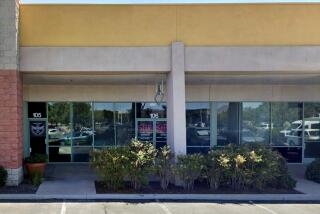O.C. tech billionaire indicted
Somewhere in the skies between Orange County and Las Vegas, federal prosecutors say, Broadcom Corp. co-founder and hard-partying billionaire Henry T. Nicholas III gave new meaning to the term “highflying.”
Winging their way to Sin City in 2001, Nicholas and his entourage generated so much marijuana smoke that it billowed into the cockpit, “requiring the pilot flying the plane to put on an oxygen mask,” according to a federal grand jury indictment made public Thursday.
The indictment, issued under seal a day earlier, accused Nicholas of doling out drugs and prostitutes as part of a freewheeling lifestyle.
A second indictment accused Nicholas of manipulating stock options at Broadcom, the Irvine-based maker of computer chips used in such products as mobile phones, Apple Inc.’s iPod and Nintendo Co.’s Wii consoles.
Broadcom co-founder Henry Samueli was not charged, but was referred to as an “unindicted co-conspirator” in the stock options indictment, which identified him by his initials.
The two founded Broadcom in 1991. They are among the best-known entrepreneurs in Southern California, having helped shape Orange County’s modern image as a technology magnet.
The Securities and Exchange Commission last month accused Samueli and Nicholas of backdating stock options to make them more valuable, leading Samueli to step aside as Broadcom’s chairman pending resolution of the case.
Samueli, who also owns the National Hockey League’s Anaheim Ducks, has denied any wrongdoing.
Nicholas, who stepped down as Broadcom’s chief executive in 2003, surrendered Thursday morning to the FBI.
In a 21-count indictment, Nicholas and William J. Ruehle, 66, Broadcom’s former chief financial officer, were accused of backdating millions of stock options for five years to improperly reward employees.
A second, four-count indictment names only Nicholas, 48, and alleges that he maintained homes and commercial properties in Orange County and Las Vegas for the “purpose of using and distributing controlled substances,” including cocaine and methamphetamine.
Among other things, Nicholas allegedly supplied Broadcom customers with prostitutes and narcotics he sometimes referred to as “party favors.” He is accused of slipping drugs into some of their drinks.
“Defendant Nicholas spiked the drinks of others with MDMA (ecstasy) without their knowledge, including . . . the drinks of technology executives and representatives who worked for Broadcom’s customers,” the indictment alleged. No victims were identified by name.
Lawyers for both men denied the allegations.
“Dr. Nicholas will contest these charges vigorously,” his lead attorney, Brendan V. Sullivan Jr. of Washington, D.C., said in a statement. “He is confident that he will be fully vindicated.”
Ruehle’s lawyer, Richard Marmaro of Los Angeles, said Ruehle “looks forward to the opportunity to clear his good name in a court of law.”
--
Under close watch
At an afternoon hearing in U.S. District Court in Santa Ana, Nicholas sat quietly in a jury box with criminal defendants from other cases, the unbuttoned sleeves of his dress shirt pulled over his handcuffs. He occasionally scowled as his lawyers and prosecutors argued over whether he should be held without bail as a flight risk and a threat to the community.
U.S. Magistrate Judge Arthur Nakazato ordered Nicholas freed on bail of $3.4 million secured by property pledged by his mother, who was in court Thursday, and a group of friends.
Nakazato ordered that Nicholas be confined to a Malibu drug treatment facility, with electronic monitoring, and that his two private planes be disabled. He warned Nicholas that he would be arrested if he violated any terms of his release, which also stipulate random drug tests.
He and Ruehle, who also appeared in court Thursday and was freed on a $2-million bond, are to be arraigned June 16.
The indictment that names both men details a conspiracy to backdate stock options to make them worth more to employees without having to report the expense to shareholders.
--
An expensive fix
To correct its books, Broadcom last year recorded $2.2 billion in previously unreported expenses -- the biggest such adjustment among the more than 200 firms whose options practices have come under scrutiny.
“By fraudulently backdating and repricing option grants, defendants and their co-conspirators deceived Broadcom’s shareholders, potential shareholders and auditors as to the nature and amount Broadcom truly was compensating its employees and officers,” the indictment alleged.
Stock options were routinely used to recruit or retain employees during the high-tech boom of the late 1990s.
The indictment details one such arrangement, when Nicholas in June 1999 hired an engineer identified in the indictment by his initials, M.N.
The then-CEO allegedly told M.N. that the 120,000 options he was to get would be backdated to May 25 of that year, increasing their value. After starting work, M.N. discovered that the grant date had been recorded as May 28, which diminished their value.
He demanded that the date be changed to the more favorable one he’d agreed upon with Nicholas. After internal discussion that involved Ruehle and others, Nicholas and Samueli in July 1999 “signed Broadcom corporate records fraudulently reflecting” the earlier date, the indictment alleges.
It was a move that would come back to bite them, according to the indictment.
After Broadcom terminated the engineer -- and his stock options -- in October 2000, his attorney presented Nicholas and Ruehle with a draft of a lawsuit that would have exposed the illegal backdating if made public, prosecutors say.
Nicholas met the engineer at an Orange County hotel, “pleaded with M.N. not to come forward with his allegations” and cut a deal to vest 85% of the options that had been canceled if he would keep the matter quiet.
“At the time of the meeting with Nicholas, this settlement offer was worth over $7 million to M.N.,” the indictment says.
Nicholas also allegedly paid $1 million in June 2002 to buy the silence of another, unnamed Broadcom employee who was aware of his illegal drug activity, the other indictment unsealed Thursday alleges.
Ruehle’s attorney, Marmaro, said his client relied on the advice of Broadcom’s auditors in operating the stock option program. He characterized the backdating problems as accounting glitches with no intent to defraud shareholders or mislead financial analysts.
“This is a classic case of government overreaching,” Marmaro said in a statement. “The government’s indictment unsuccessfully attempts to transform a company’s technical accounting error into criminal conduct.”
--
Claims of sex and drugs
In the drug indictment, Nicholas is alleged to have used death threats and payoffs to conceal his “unlawful conduct.”
The indictment describes repeated drug purchases for Nicholas, which were sometimes disguised as “supplies” or “refreshments” on invoices.
“In or around 2001, in the lobby of Broadcom’s offices . . . Nicholas directed a Broadcom employee to provide approximately $5,000 to $10,000 in cash to a drug courier in exchange for an envelope containing controlled substances,” the indictment alleges.
The document also lists three properties described in previous Los Angeles Times stories about Nicholas’ alleged indulgences in drugs and prostitutes:
* An equestrian estate in Laguna Hills, where Nicholas had constructed a series of tunnels and underground rooms, including one that contractors alleged was intended to become a “secret and convenient lair” to indulge his “manic obsession with prostitutes.”
* A warehouse-office complex in nearby Laguna Niguel, which contractors said was used for sex and drugs and nicknamed “The Ponderosa.”
* A Newport Coast residence where Nicholas was trying to start a record company and where rock groups frequently visited.
In a 2006 lawsuit seeking back wages, former Nicholas aide Kenji Kato contended that this home also was the scene of frequent drug use and other sordid behavior.
“The allegations of our complaint seem to be validated by the indictment -- both indictments,” said Joseph Kar, the attorney for Kato, whose lawsuit is pending in Los Angeles County Superior Court.
The indictments illustrate that Nicholas used his businesses and employees “to protect himself and to carry out his personal whims,” Kar said. “The long and short of it is his personal whims were illegal.”
The stock option allegations outlined in the indictment were similar to the SEC lawsuit last month that accused Nicholas, Ruehle, Samueli and the company’s former general counsel, David Dull, of backdating stock options.
Samueli and Dull were not named in the indictment unsealed Thursday, although the government could still seek to charge them later.
Samueli, a prominent philanthropist, was Nicholas’ engineering professor at UCLA.
Nicholas quit the company in 2003, saying he wanted to spend time trying to repair his marriage, which later fell apart.
Although Samueli stepped down from his executive role at Broadcom when the SEC lawsuit was filed, he remains at the company in an advisory capacity.
--
kim.christensen@latimes.com
--
(BEGIN TEXT OF INFOBOX)
Among the allegations
Federal grand jury indictments unsealed Thursday allege that Broadcom Corp. co-founder Henry T. Nicholas III:
* “Spiked the drinks of others with MDMA (ecstasy) without their knowledge, including . . . the drinks of technology executives and representatives who worked for Broadcom’s customers.”
* “Hired prostitutes and escorts for himself and customers, representatives and associates of Broadcom and other business entities with which he was affiliated and supplied such prostitutes and escorts with controlled substances.”
* “Used threats of physical violence and death and payments of money to attempt to conceal his unlawful conduct.”
* “Constructed an underground room and tunnel” at a home where illicit drugs were supplied.
* “Distributed and used controlled substances during a flight on a private plane between Orange County, California, and Las Vegas, Nevada, causing marijuana smoke to enter the cockpit and requiring the pilot flying the plane to put on an oxygen mask.”
* “Entered into a $1-million settlement agreement . . . with a Broadcom employee who had knowledge of defendant Nicholas’ unlawful narcotics activities.”
* Fraudulently backdated millions of stock option grants over a five-year period, along with former Broadcom Chief Financial Officer William J. Ruehle.
* Persuaded a former Broadcom engineer to drop a lawsuit that would have exposed the backdating scheme at the Irvine computer chip maker.
Source: Federal grand jury indictments
--
Broadcom’s history
Henry T. Nicholas III founded Broadcom in 1991 with Henry Samueli. Here is a history of the Irvine-based maker of computer chips used in iPods, mobile phone headsets and Nintendo’s Wii video console:
1991: Samueli and Nicholas write checks for $5,000 each to launch Broadband Telecom; it operates out of Nicholas’ Redondo Beach home.
1995: Broadcom moves to Irvine.
April 17, 1998: Broadcom goes public; the stock jumps 123% on its first day of trading.
2000: Broadcom, with 2,391 employees, joins the S&P; 500 as revenue tops $1 billion.
Jan. 23, 2003: Nicholas quits as chief executive.
Feb. 25, 2005: Samueli and his wife, Susan, buy the Mighty Ducks National Hockey League team from Walt Disney Co. for $75 million.
May 18, 2006: Broadcom’s audit committee begins review of option grants after analysts and the media suggest the company used backdating
to boost the value of grants.
June 9, 2006: The Securities and Exchange Commission tells Broadcom it will seek information on its stock option grants.
July 14, 2006: Broadcom says its own review found misdated option grants from 2000 through 2002.
Sept. 8, 2006: Broadcom reports finding misdated options back to 1998, estimates charges of at least $1.5 billion.
Dec. 14, 2006: The SEC issues formal order of investigation, giving it subpoena power.
April 22, 2008: Broadcom agrees to pay $12 million to settle SEC charges of backdating options.
May 14: The SEC files a civil complaint accusing Samueli, Nicholas, former Chief Financial Officer William Ruehle and General Counsel
David Dull of fraudulently backdating options. Samueli steps aside as chairman and chief technical officer pending resolution of the complaint.
June 4: A federal grand jury indicts Nicholas and Ruehle, accusing them of backdating millions of stock options for five years to improperly reward Broadcom employees. A second indictment naming only Nicholas alleges that he maintained homes and commercial properties in Orange County and Las Vegas to distribute illegal drugs.
Source: Times research








